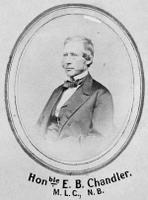
Edward Barron Chandler was an influential force in New Brunswick politics in the decades preceding Confederation, serving as the leader of the government from 1843 to 1854, a period in which responsible government was introduced and evolved. A Father of Confederation, Chandler participated in the conferences at Charlottetown, Québec and London.
Early Life and Career
Born into a prominent Loyalist family, Edward Barron Chandler was raised and educated in Amherst, Nova Scotia. After studying law in the firm of his cousin, William Botsford, in Westcock, New Brunswick, he was admitted to the New Brunswick Bar in 1823 and established a practice in Dorchester. The same year he was appointed a judge of probate and clerk of the peace for Westmorland County.
Political Career
Elected to represent Westmorland County in the New Brunswick Legislative Assembly in June 1827, Edward Barron Chandler soon emerged as a prominent member despite his relative youth. Although he embodied the Loyalist establishment, Chandler earned a reputation as a spokesman of the people due in part to his support of Acadian and Catholic rights.
Chandler advocated for increased powers for the elected Assembly, particularly regarding control of crown lands and other revenue, though not at the expense of the colonial establishment’s privileges. While he was cautiously supportive of moderate democratic reforms — out of pragmatism rather than high-minded ideals — he was not, at this point, an advocate of responsible government.
In 1836, Chandler was appointed to the Legislative Council, New Brunswick’s unelected upper chamber. In 1843, upon his appointment to the Executive Council, he became the acknowledged leader of the "compact" government. Historian W. S. MacNutt characterized Chandler as "shrewd and enterprising but cold and unemotional," a politician who insisted on reason over idealism in decision-making and urged colleagues to reach compromises.
Chandler was active in negotiations to construct railways connecting New Brunswick with its neighbours in the early 1850s, and was among those who travelled to Washington in 1854 to negotiate a Reciprocity Treaty with American authorities.
Although New Brunswick didn't see the public agitation for reform experienced elsewhere in British North America, the British were keen to see responsible government introduced (see Rebellions of 1837). Lieutenant-Governor Sir Edmund Walker Head retained Chandler, in 1848, as leader of the first New Brunswick administration that aspired to principles of responsible government. To ensure that the Executive Council enjoyed the confidence of the Assembly, Head and Chandler appointed two prominent reformers, Lemuel Allan Wilmot and Charles Fisher. However, beneath this veneer, governing proceeded much as it had previously.
In 1854, opposition leader Charles Fisher challenged the authority of the "compact" government in the Assembly. In response, Chandler and his Executive Council resigned, becoming the first New Brunswick executive to be truly responsible to the Assembly.
Confederation
Still a highly respected member of the upper chamber, Edward Barron Chandler was invited to join the New Brunswick delegation to the Charlottetown Conference in 1864. Although he'd never taken a strong stand on the issue, Chandler became convinced that Confederation was inevitable, and he lobbied for terms favourable to New Brunswick. To this end, he argued that Maritime union in advance of Confederation would give the region a stronger negotiating position, but the idea was not popular among his colleagues.
At Québec, on 24 October 1864, Chandler argued for provincial rights, proposing that, outside of certain clearly defined powers assigned to the central government, the balance of power should rest with the provincial legislatures. While some delegates were sympathetic, Chandler's suggestion provoked backlash from many others, including John A. Macdonald. He opposed the weakening of the federal authority, suggesting that, in the United States, devolving too much power to local governments had resulted in the Civil War.
In 1865, after Samuel Leonard Tilley’s government was defeated by Albert James Smith’s anti-Confederation coalition, Chandler used his position in the unelected chamber to continue campaigning for Confederation and to undercut Smith's appeal. When Tilley was returned to office after the 1866 election, Chandler was among the delegates who travelled to London to finalize the terms of Confederation.
See also New Brunswick and Confederation.
Life and Career after Confederation
Edward Barron Chandler was appointed to the Senate on 23 October 1867, but declined the following day. In 1868, he was appointed one of the commissioners supervising the construction of the Intercolonial Railway from Nova Scotia to Québec, a position he held until 1878. Chandler accepted an appointment as lieutenant-governor of New Brunswick in 1878, serving in that capacity until his death on 6 February 1880.
Legacy
Occupying public office for nearly 60 continuous years, Edward Barron Chandler was strongly identified with the "compact." Though he also demonstrated a cautious approach to moderate democratic reforms, it was out of pragmatism rather than high-minded ideals. After serving as the effective leader of the New Brunswick government for over 10 years, his resignation in 1854 confirmed the establishment of responsible government in New Brunswick. Chandler approached the Confederation debates with the intention of securing favourable terms for New Brunswick.

 Share on Facebook
Share on Facebook Share on X
Share on X Share by Email
Share by Email Share on Google Classroom
Share on Google Classroom

